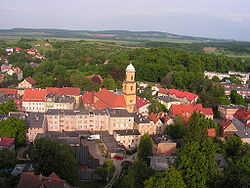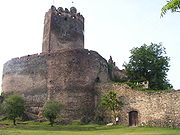Bolków: Difference between revisions
embed {{Authority control}} with wikidata information |
m →Overview and history: Fixing links to disambiguation pages, replaced: Palestine → Palestine using AWB |
||
| Line 32: | Line 32: | ||
First mentioned as ''Hain'' in a 1276 deed, Bolków was named after Duke [[Bolko II of Świdnica]], who died in 1368. His duchy was incorporated into the [[Czech Lands|Lands of the Bohemian Crown]] of the [[Holy Roman Empire]]. Prior to 1945 it was in [[Germany]]. After [[World War II]] the region was placed under Polish administration and [[ethnic cleansing|ethnically cleansed]] according to the post-war [[Potsdam Agreement]]. The native German populace was [[expulsion of Germans after World War II|expelled]] and replaced with [[Poles]]. Since 1945 the town belongs to Poland. |
First mentioned as ''Hain'' in a 1276 deed, Bolków was named after Duke [[Bolko II of Świdnica]], who died in 1368. His duchy was incorporated into the [[Czech Lands|Lands of the Bohemian Crown]] of the [[Holy Roman Empire]]. Prior to 1945 it was in [[Germany]]. After [[World War II]] the region was placed under Polish administration and [[ethnic cleansing|ethnically cleansed]] according to the post-war [[Potsdam Agreement]]. The native German populace was [[expulsion of Germans after World War II|expelled]] and replaced with [[Poles]]. Since 1945 the town belongs to Poland. |
||
A training camp for Jewish volunteers to [[Hagana]] was established in 1947 in Bolków. The camp trained 7000 soldiers who then traveled to [[Palestine]] and it existed until the end of 1948.<ref>[http://www.sztetl.org.pl/ru/article/bolkow/7,-/33378,hagana-s-training-camp-in-bolkow/ Hagana's training camp in Bolkow]</ref> |
A training camp for Jewish volunteers to [[Hagana]] was established in 1947 in Bolków. The camp trained 7000 soldiers who then traveled to [[Palestine (region)|Palestine]] and it existed until the end of 1948.<ref>[http://www.sztetl.org.pl/ru/article/bolkow/7,-/33378,hagana-s-training-camp-in-bolkow/ Hagana's training camp in Bolkow]</ref> |
||
Above the town stand the ruins of Bolków Castle, built in the 13th century. Devastated in the [[Thirty Years' War]] it became a property of [[Grüssau Abbey]] in 1703, though restoration efforts did not begin until 1905. Since 1994 the ruin is the site of the annual "Castle Party" [[Gothic rock]] [[rock festival|festival]]. |
Above the town stand the ruins of Bolków Castle, built in the 13th century. Devastated in the [[Thirty Years' War]] it became a property of [[Grüssau Abbey]] in 1703, though restoration efforts did not begin until 1905. Since 1994 the ruin is the site of the annual "Castle Party" [[Gothic rock]] [[rock festival|festival]]. |
||
Revision as of 12:21, 9 September 2015
Bolków | |
|---|---|
 View over the town | |
| Country | |
| Voivodeship | Lower Silesian |
| County | Jawor |
| Gmina | Bolków |
| Area | |
• Total | 7.68 km2 (2.97 sq mi) |
| Elevation | 380 m (1,250 ft) |
| Population (2010) | |
• Total | 5,301 |
| • Density | 690/km2 (1,800/sq mi) |
| Website | http://www.bolkow.pl |
Bolków [ˈbɔlkuf] (Template:Lang-de) is a town in Jawor County, Lower Silesian Voivodeship, in south-western Poland. It is the seat of the administrative district (gmina) called Gmina Bolków and part of the Neisse-Nysa-Nisa Euroregion.
Overview and history

The town lies at the Nysa Szalona River, approximately 15 kilometres (9 mi) south-west of Jawor, and 70 kilometres (43 mi) west of the regional capital Wrocław. As at 30 June 2010, it has a population of about 5,301.
First mentioned as Hain in a 1276 deed, Bolków was named after Duke Bolko II of Świdnica, who died in 1368. His duchy was incorporated into the Lands of the Bohemian Crown of the Holy Roman Empire. Prior to 1945 it was in Germany. After World War II the region was placed under Polish administration and ethnically cleansed according to the post-war Potsdam Agreement. The native German populace was expelled and replaced with Poles. Since 1945 the town belongs to Poland.
A training camp for Jewish volunteers to Hagana was established in 1947 in Bolków. The camp trained 7000 soldiers who then traveled to Palestine and it existed until the end of 1948.[1]
Above the town stand the ruins of Bolków Castle, built in the 13th century. Devastated in the Thirty Years' War it became a property of Grüssau Abbey in 1703, though restoration efforts did not begin until 1905. Since 1994 the ruin is the site of the annual "Castle Party" Gothic rock festival.
Notable residents
- Herbert Puschmann (1920–1944), Luftwaffe pilot
- Heinrich Windelen (1921-2015), German politician
International relations
Twin towns — Sister cities
Bolków is twinned with:
 Heerde, Netherlands, since 1991
Heerde, Netherlands, since 1991 Dragsholm, Denmark, since 1995
Dragsholm, Denmark, since 1995 Borken, North Rhine-Westphalia, Germany, since 1997
Borken, North Rhine-Westphalia, Germany, since 1997 Doksy, Czech Republic, since 2006
Doksy, Czech Republic, since 2006 Bad Muskau, Germany, since 2006
Bad Muskau, Germany, since 2006 Nünchritz, Germany, since 2007
Nünchritz, Germany, since 2007
References
External links
50°56′N 16°06′E / 50.933°N 16.100°E



